Essential Nutrients for Promoting Cardiovascular Health

The global prevalence of cardiovascular disease (CVD) is projected to reach an estimated 612 million individuals in 2025.1 In the U.S., heart disease is the leading cause of death with nearly 75% of cases being preventable with lifestyle modifications and nutritional support.2 These findings indicate the need for proper nutrition support for healthy cardiovascular functioning and a healthy heart. Below are nutrients clinically demonstrated to be essential for promoting cardiovascular health.
Vitamin C: Antioxidants for Heart Health

Vitamin C is an important vitamin commonly used for its immune supporting properties. It has also been shown to support the cardiovascular system due to its antioxidant capacity. More specifically, vitamin C has been shown to promote endothelial function, which is the lining of blood vessels. This reduces the risk and development of atherosclerosis. Vitamin C has been shown to lower blood pressure and improve cholesterol levels.3
Some studies show that a deficiency of vitamin C is highly correlated to a higher risk of mortality for those with cardiovascular disease and for development of cardiovascular disease.4
Vitamin E: Anti-inflammatory and Antioxidant Protection against Cardiovascular Disease
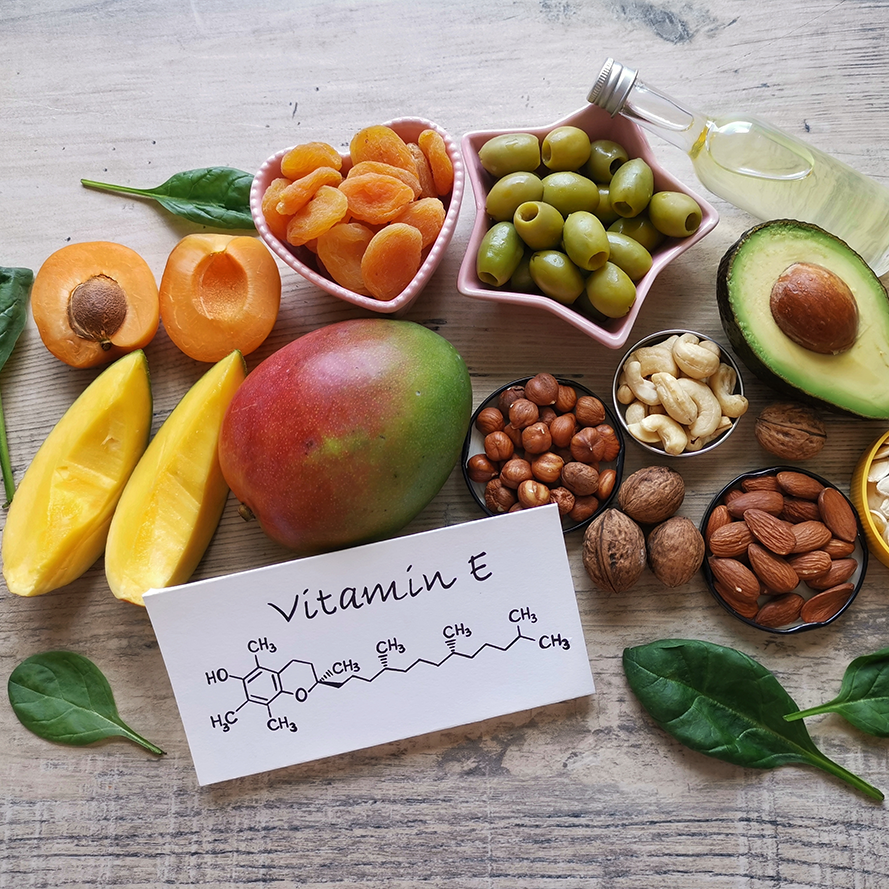
Similar to vitamin C, vitamin E has anti-inflammatory and antioxidant properties that have demonstrated immense protection against, and the reduction of, cardiovascular disease. Vitamin E is capable of scavenging lipid radicals, or inflammatory molecules, and terminating their oxidative chain reaction. By scavenging these free radicals, vitamin E can provide support in reducing damage to the endothelial cells and arterial walls.5
Additionally, vitamin E has been shown to inhibit oxidation of LDL cholesterol and reduce high levels of LDL cholesterol, which is commonly attributed to cardiovascular disease.6
Some research demonstrates protective effects of vitamin E in preventing coronary artery disease because of its ability to slow the uptake of LDL cholesterol into the arterial lumen.7 While studies are still mixed in results, they demonstrate the importance of vitamin E as an antioxidant compound to reduce cardiovascular disease risk.
Riboflavin (B2) Impacts on Blood Pressure and Homocysteine
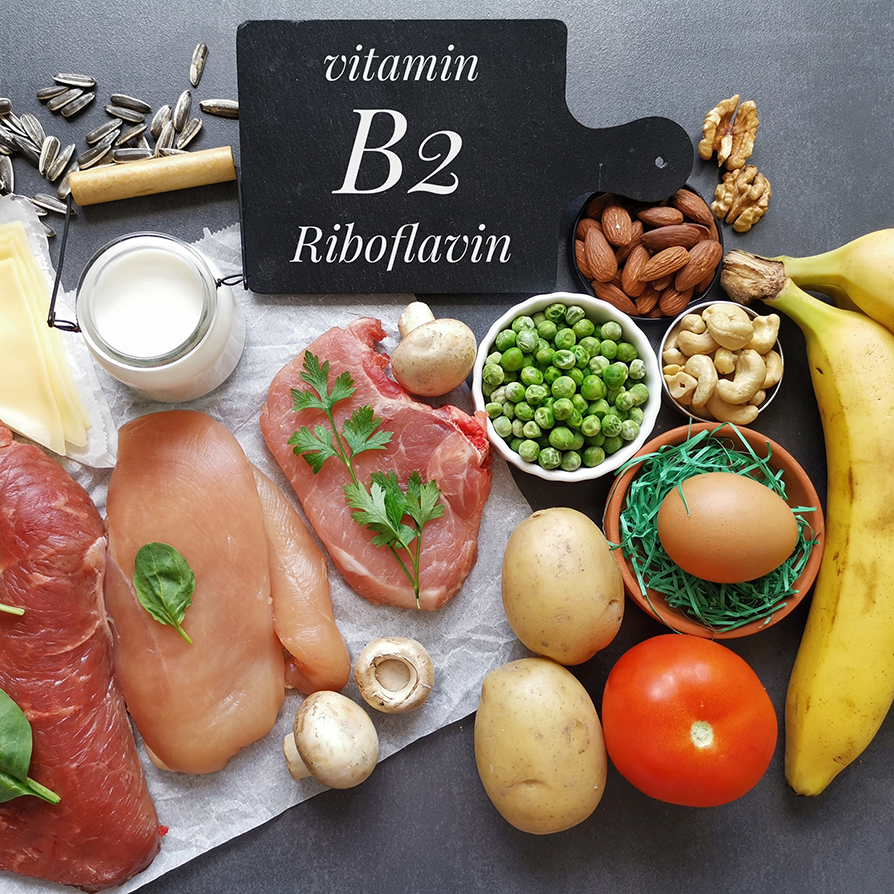
Riboflavin, or B2, has demonstrated specific benefit to improving cardiovascular health and reducing disease risk, specifically by lowering blood pressure and homocysteine levels. Riboflavin has been linked to reduction of all-cause mortality for patients with cardiovascular disease, indicating that a deficiency could possibly be a root cause of CVD development.8
In addition to the benefits of riboflavin for reducing CVD risk, riboflavin is a precursor to flavin coenzymes, or flavine adenine dinucleotide (FAD) and flavin mononucleotide (FMN).
Essentially, these coenzymes influence energy production by supporting the breakdown and utilization of carbohydrates in the TCA cycle and influencing the electron transport chain. Riboflavin can be considered a mitochondrial support nutrient, influencing the production of energy and supporting metabolism of nutrients.9
Niacin: Natural Ability to Reduce Lipid Levels
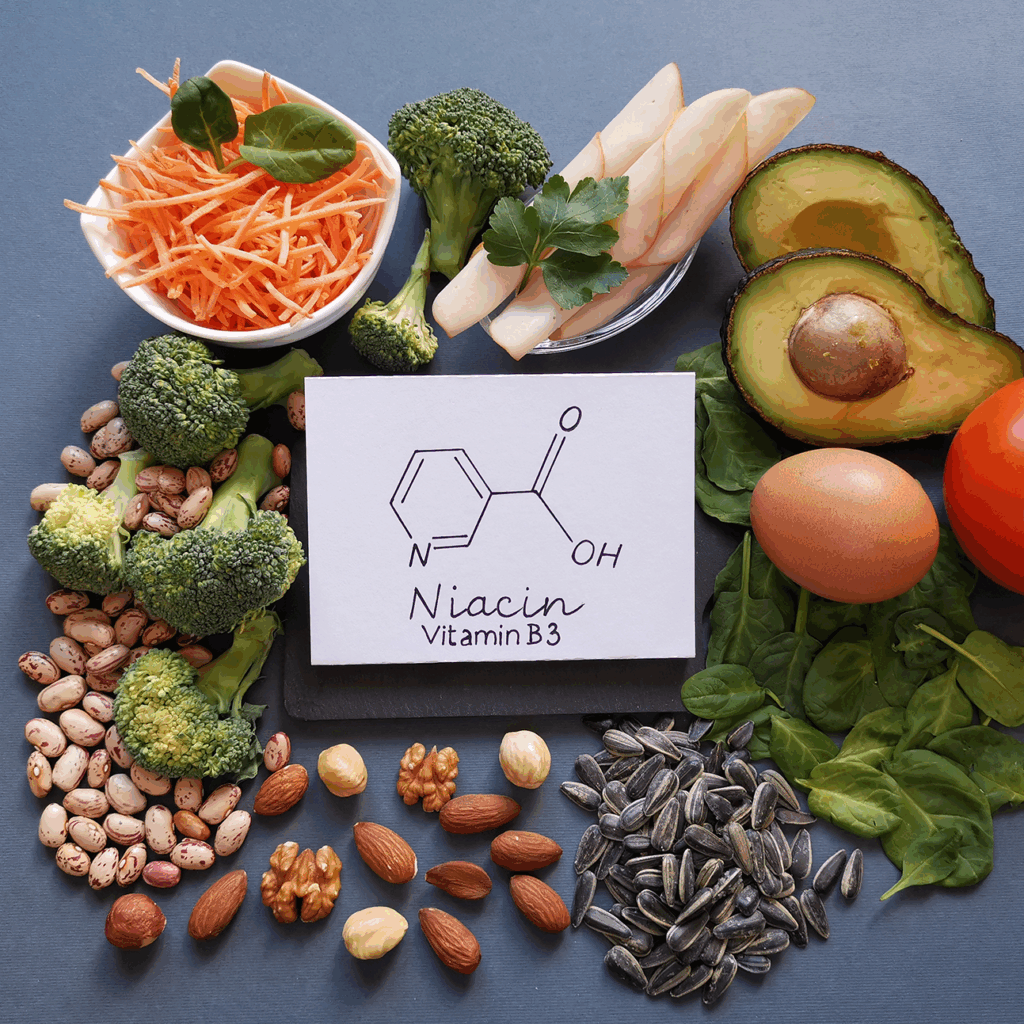
Niacin has commonly been referred to as the antidyslipidemic drug; it has been one of the most prevalent nutrients to reduce lipid levels, even before the discovery of statins. Nicotinamide, one of the forms of niacin, is the primary cardiac NAD+, or nicotinamide adenine dicnucleoide, as well as NADP+, or nicotinamide adenine dunucleotide phosphate. Similar to riboflavin coenzymes, NAD+ and NADP+ are influential in the citric acid cycle which influences energy production. Additionally, niacin has been shown to be impactful in promoting cardiac healing after a myocardial infarction.10
While niacin on its own provides immense benefits to the cardiovascular system, riboflavin and niacin paired together has been shown to inhibit low HDL cholesterol levels.11
Pyridoxine (B6): Reducing Homocysteine and Cardiac Inflammation

Vitamin B6, or Pyridoxine, is a well-known nutrient used to reduce homocysteine levels and reduce inflammation within the cardiovascular system. By regulating the circulation and pathway of homocysteine, Vitamin B6 reduces the risk of arterial damage and myocardial infarction. There have been studies conducted that show B6 consumption is directly linked to a decreased risk of stroke.12
There is a direct link between Vitamin B6 and an increased risk of cardiovascular disease states.13 Additionally, some studies demonstrate B6 inhibiting the inflammatory response within the cardiovascular system, thereby reducing risk of oxidative damage.14
Choline: Microbiome for Cardiovascular Health
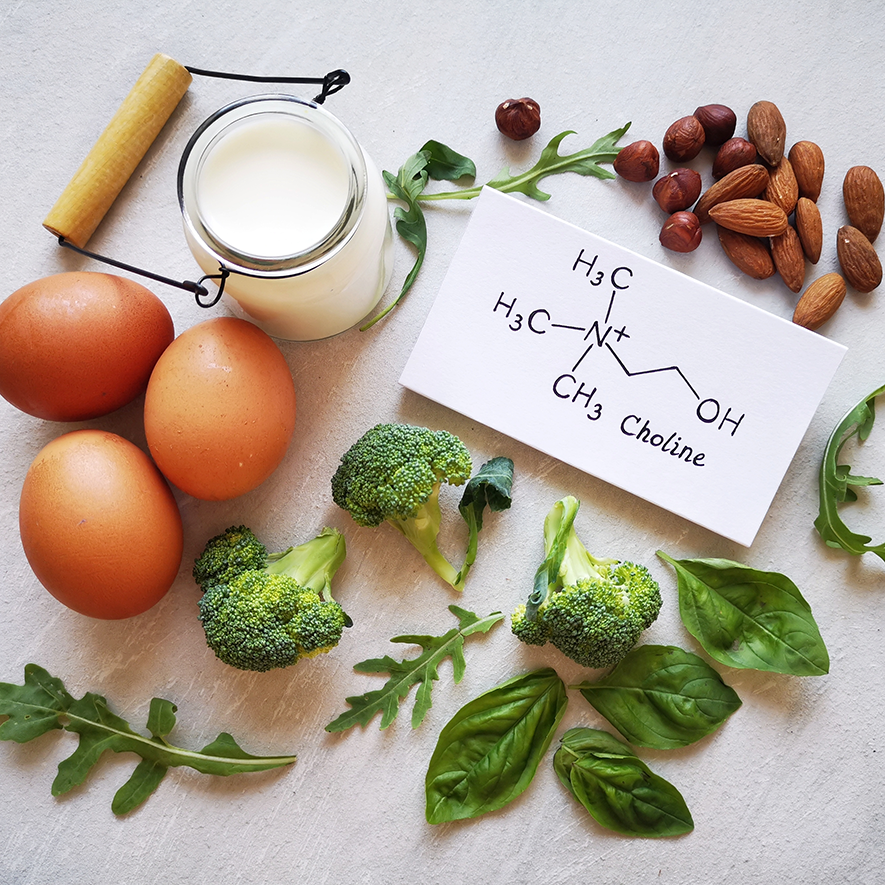
Choline provides unique benefits to the cardiovascular system. Choline has been linked to cardiovascular protective effects by reversing or halting the progression of cardiovascular disease states, like hypertension or stroke. Choline interacts with gut bacteria to product trimethylene N-oxide (TMAO). TMAO has been shown to protect heart proteins against stress and oxidative damage that can occur from genetic predisposition or lifestyle choices.15
Selenium
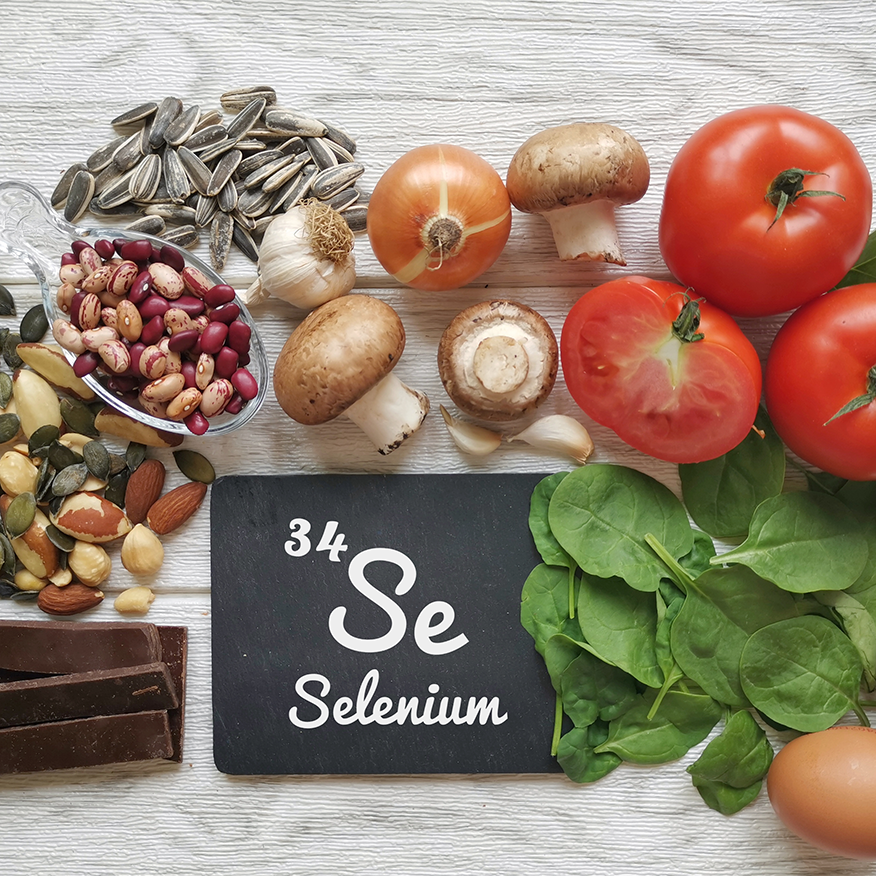
Selenium is widely known as the thyroid supportive nutrient, providing important precursors to thyroid hormone synthesis. Another important function of selenium is to act as an antioxidant. As an antioxidant, selenium has been linked to reducing the risk of heart disease and heart attack by promoting the strength and health of arterial channels and reducing apoptosis.16
One study has highlighted selenium deficiency as a root cause of coronary heart disease, with almost 25% of the study showing reduction of risk with selenium supplementation.17
Additionally, studies have found low SELENOP levels have been associated with increased risk of mortality with acute heart failure and all-cause mortality.18
Clinical Takeaway
While there are an abundance of factors influencing cardiovascular disease risk, there are certain nutrients that can be utilized to prevent deficiencies, reverse disease progression, and take a proactive approach to reducing disease risk to support those populations with cardiovascular disease concerns.
Did you know Wholistic Matters is powered by Standard Process? Learn more about Standard Process’ whole food-based nutrition philosophy.
Resources
- 2025 Heart Disease & Stroke Statistics Update Fact Sheet: Global Burden of Disease. American Heart Association, 2025.
- Heart Disease Remains Leading Cause of Death as Key Health Risk Factors Continue to Rise. American Heart Association, 2025.
- Morelli, M. B., Gambardella, J., Castellanos, V., Trimarco, V., Santulli, G. (2020). Vitamin C and Cardiovascular Disease: An Update. Antioxidants, 9(12), 1227. doi: 3390/antiox9121227
- Moser, M. A., Chun, O. K. (2016). Vitamin C and Heart Health: A Review Based on FIndings from Epidemiologic Studies. International Journal of Molecular Sciences, 17(8), 1328. doi: 3390/ijms17081328
- Vardi, M., Levy, N. S., Levy, A. P. (2013). Vitamin E in the Prevention of Cardiovascular Disease: The Importance of Proper Patient Selection. Journal of Lipid Research, 54(9), 2307-2314. doi: 1194/jlr.R026641
- Mohsen, M. (2001). Vitamin E and Atherosclerosis: Beyond Prevention of LDL Oxidation 1,2. The Journal of Nutrition, 131(2), 3665-3685. https://doi.org/10.1093/jn/131.2.366S
- Pruthi, S., Allison, T. G., Hensrud, D. D. (2001). Vitamin E Supplementation in the Prevention of Coronary Heart Disease. Mayo Clinic Proceedings, 76(11), 1131-1136. DOI: 4065/76.11.1131
- Li, M., Shi, Z. (2022). Riboflavin Intake Inversely Associated with Cardiovascular-Disease Mortality and Interacting with Folate Intake: Findings from the National Health and Nutrition Examination Survey (NHANES) 2005 – 2016. Nutrients, 14(24). doi: 10.3390/nu14245345
- Udhayabanu, T., Manole, A., Rajeshwari, M., Varalakshmi, P., Houlden, H., Ashokkumar, B. (2017). Riboflavin Responsive Mitochondrial Dysfunction in Neurodegenerative Diseases. Journal of Clinical Medicine, 6(5), 52. doi: 3390/jcm6050052
- Shi, C., Wen, Z., Yang, Y., Shi, L., Liu, D. (2024). NAD+ Metabolism and Therapeutic Strategies in Cardiovascular Diseases. Atherosclerosis Plus, 57, 1-12. https://doi.org/10.1016/j.athplu.2024.06.001
- Lee, J. S. (2019). Relationship of Riboflavin and Niacin with Cardiovascular Disease. Korean Journal of Clinical Laboratory Science, 51, 484-494. https://doi.org/10.15324/kjcls.2019.51.4.484
- Jeon, J., Park, K. (2019). Dietary Vitamin B6 Intake Associated with a Decreased Risk of Cardiovascular Disease: A Prospective Cohort Study. Nutrients, 11(7), 1484. doi: 3390/nu11071484
- Friso, S., Lotto, V., Corrocher, R., Choi Woon, S. (2012). Vitamin B6 and Cardiovascular Disease. Subcell Biochem, 56, 265-290. DOI: 1007/978-94-007-2199-9_14
- Haung, J., Khatun, P., Xiong, Y., Liu, B., Zhao, Y., Lyu, Q. (2023). Intaks of Folate, Vitamin B6, and VItamin B!2and Cardiovascular Disease Risk: A National Population-Based Cross-Sectional Study. Frontiers in Cardiovascular Medicine, 10. DOI: 1007/978-94-007-2199-9_14
- Zhou, R., Yang, M., Yue, C., Shi, Y., Tan, Y., Zha, L., Zhang, J., Chen, S. (2023). Association Between Dietary Choline Intake and Cardiovascular Diseases: National Health and Nutrition Examination Survey 2011-2016. Nutrients, 15(18), 4036. doi: 3390/nu15184036
- Shalihat, A., Hasanah, A. N., Mutakin, Lesmana, R., Budiman, A., Gozali, D. (2021). The Role of Selenium in Cell Survival and Its Correlation with Protective Effects Against Cardiovascular Disease: A Literature Review. Biomedicine & Pharmacotherapy, 134(111125). https://doi.org/10.1016/j.biopha.2020.111125
- Flores-Mateo, G., Navas-Acien, A., Pastor-Barriuso, R., Guallar, E. (2007). Selenium and Coronary Heart Disease: A Meta-Analysis. American Journal of Clinical Nutrition, 84(4), 762-773. doi: 1093/ajcn/84.4.762
- Shimada, B. K., Alfulaij, N., Seale, L. A. (2021). The Impact of Selenium Deficiency on Cardiovascular Function. International Journal of Molecular Science, 22(19), 10713. doi: 3390/ijms221910713







